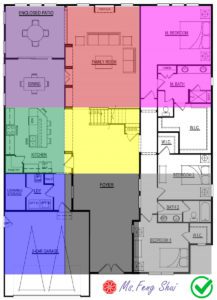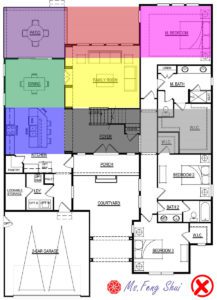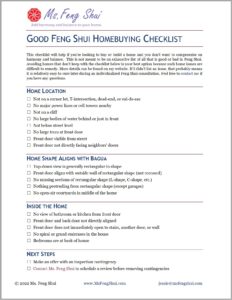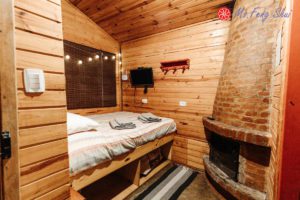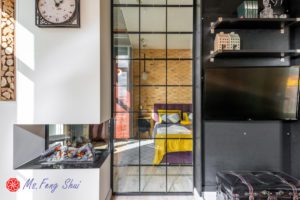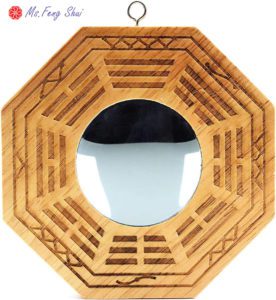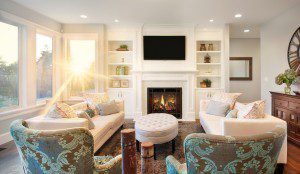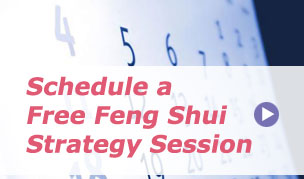Currently browsing: Home Builders
Home Buying Checklist for Good Feng Shui
When the real estate market was hot, it was difficult to even get an offer in on a home. You couldn’t be picky because you would lose a bidding war for a home with good Feng Shui. When interest rates and home inventory are on the rise, it’s even more difficult to sell a home. But that’s a good thing if you’re looking to buy a home with great Feng Shui.
When I work with home builders, I advise against site plans that include cul-de-sacs, T-intersections, overhead power lines, etc. This is especially important in Feng Shui aware areas. If home builders don’t take my advice, they are forced to significantly reduce pricing to unload bad Feng Shui homes. But how do we know what homes for resale have good or bad Feng Shui?
Why Feng Shui?
If you’re not a believer in Feng Shui, that’s fine. Please note, however, that most of the Feng Shui suggestions I provide also have more modern and practical reasoning. Additionally, you can sell a home with good Feng Shui faster and for more money. You like money, don’t you?
The following checklist will help if you’re looking to buy or build a home with good Feng Shui. However, this is not meant to be an exhaustive list of all that is good or bad in Feng Shui. Avoid homes that don’t keep with the checklist below. This is your best option because such home issues are difficult to remedy. Any issues missing from this list are likely relatively easy to cure later during an individualized Feng Shui consultation. Feel free to contact me if you have any questions.
Street Location
⬜ No Corner Lot: I know… corner lot homes come with some extra land. But, they also provide bad Feng Shui. An overwhelming amount of energy inundates corner lot homes, so they should be avoided at all costs. From a practical sense, corner lot homes also have more disturbances like car and foot traffic. More info…
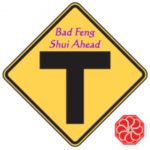
⬜ No T-Intersection: Overwhelming energy is also an issue for homes at a T-intersection. This is especially true of those at the top of the T. You’ll notice also that such homes often have concrete blocks along their sidewalks. That’s because sometimes cars end up mistakenly driving right into the house. Avoid homes at a T-intersection. More info…

⬜ No Cul-de-sac: Cul-de-sac homes can seem great because the kids can play street hockey. However, if you want to avoid potential money and health issues, avoid buying a home on a cul-de-sac. Its energy sweeps through like a vortex. Headlights from cars turning in front of the home also cause a frequent disturbance. More info…
Home Surroundings
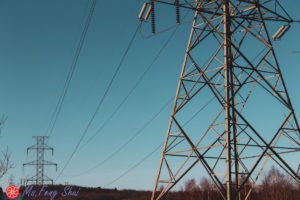
⬜ No EMF Radiation: If you’ve read my blog post on electromagnetic fields (EMF), you’ll know that we should probably avoid sources of electrical energy. Anecdotally, I have found that they disturb sleep. The jury is still out on several studies that may prove more harmful effects of EMF. Have you ever stood under major power lines and heard zapping or humming sounds that they emit? Yeah, I would just completely avoid homes near, and especially under, major power lines, cell towers, etc. If you can measure the EMF from the house, absolutely avoid it. More info…
⬜ No Cliffs: Stay away from homes at the top of a cliff. It doesn’t matter whether it is at the front or back of your home. While the view might be amazing, you just won’t get the positive energy you need. It would be better to have a home that backs up to a hill that is higher than your home. This helps capture the flow of any energy headed your way. Just make sure there aren’t any loose rocks up there!
⬜ No Large Bodies of Water: Avoid large bodies of water behind your home. This will douse your Fame & Reputation Area. Having a view of the lake or ocean in front of your home, however, is just fine because it supports your Career Area. Just don’t be right along the shoreline because that energy can be overwhelming.
⬜ Not Below Street Level: The vertical location of the base of the home compared to the street level is rather important in Feng Shui. The best scenario is if the bottom of the home is a little higher than the street level. We want to avoid homes that are lower than the street level because career opportunities will pass over you and because those homes are more prone to flooding.
⬜ Front Door Visible From Street: The front door should be clearly visible from the street. This ensures that positive energy can flow to your home. Objects like large trees block visibility from the street and therefore block energy coming into your home. If there is a small tree, see if there are any rules that would prevent you from moving it. More info…
⬜ Front Door Doesn’t Face Neighbors’ Doors: To avoid confrontations with your neighbors, make sure that your front door does not directly face any of your neighbors’ doors.
Home Shape Aligns with Bagua
⬜ Rectangular Shape: I only suggest homes that have a top-down view of the home that is generally rectangular in shape. This helps so that it can match with the Feng Shui Bagua. Otherwise, I would avoid purchasing it. More info…
⬜ Front Door Location: Make sure that the front door is aligned with the outside edge of the rectangular outline of the home. Avoid homes with recessed front doors. Any parts of the home hanging out beyond the door will be outside of your Bagua.
⬜ No Missing Sections: If there is a significant section of the rectangle missing (L-shape or C-shape, for instance), you are likely missing an important section of the home’s Bagua. The most common missing areas are the Prosperity & Wealth Corner and the Love & Relationships Corner.
⬜ No Protrusions: If a section of the home is protruding out (other than just the garage), that area will be outside of your Bagua. Anyone in that space would feel left out and any designated functions in those spaces, such as a home office, may be ineffective.
⬜ No Open-Air Courtyards: If you have an open-air courtyard in the middle of your home, you are likely missing an important section of the home’s Bagua for your Health Area.
Inside the Home
⬜ No Front & Back Door Alignment: Try to avoid homes where the front door directly lines up with the back door in your sightline because your energy will just flow right out the back. More info…
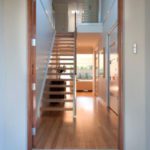
⬜ Front Door Energy Flow: If you don’t want your energy to go down the drain, you do not want to see a bathroom or the kitchen when you open your front door. When you open your door to walk in the home, you should not immediately face stairs, another door, or a wall because you want energy to flow more freely through the downstairs areas.
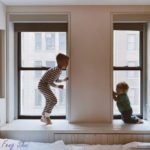
⬜ Bedrooms in Back: In general, all bedrooms should be in the back part of the house. This is especially important for small children in your family. If you want calm, rested children, having them see the street from their bedrooms might be counterproductive. More info…

⬜ No Spiral or Grand Staircases: Consider a spiral staircase to be like a corkscrew, harmfully digging into a particular section of the Bagua in the home or office. Because of their often-circular nature, any energy that flows up the left side of a grand staircase just goes right back down the right staircase, completely bypassing much of the second floor of the home. More info…
Next Steps
⬜ Make an Offer: Timing is sometimes of the essence when making an offer on a house, but that doesn’t mean you should rush through a purchase without doing your due diligence. Make an offer with an inspection contingency, during which time you can make sure that the house is perfect as a home. More info…

⬜ Schedule a Feng Shui Review: Contact me to schedule a review before removing contingencies. This way, we can confirm that there aren’t any other major issues to be concerned with before you commit to the purchase. More info…
The information here is rather thorough. When you’re shopping for a home, here is a printable PDF version of this checklist.
Through my inexpensive Feng Shui Real Estate Review, I have helped thousands of people analyze homes they are looking to potentially buy to make sure they are getting a house with great Feng Shui. I also provide more thorough Feng Shui consultations for recently purchased homes without requiring investment in a bunch of silly trinkets. I can do the same for you with a Feng Shui Video Consultation.
Is it Good Feng Shui to Have a Fireplace in the Bedroom?
Fireplaces can add warmth, aroma, and ambiance to your room, but is it good feng shui to have a fireplace specifically in your bedroom? My short answer is generally no. In fact, when I work with home builders, I always suggest they remove plans to automatically include a fireplace in any bedroom.
Here are a few reasons why it is bad feng shui to have a fireplace in your bedroom:
- Fireplaces provide exciting energy. In feng shui, fire is associated with passion, excitement, and transformation. These can certainly be positive qualities in some areas of your home, but not here. Your bedroom is a space to get some rest and relaxation.
- Fireplaces can be a safety hazard. A fireplace increases the risk of fire in your home. Even if you don’t actively use your bedroom fireplace, it can create an unconscious sense of stress, which certainly doesn’t help you relax. Certainly never fall asleep with a fireplace on.
- Fireplaces can disrupt sleep. Heat and light emitted by your bedroom fireplace can interfere with your precious sleep. Your bedroom should be cool, dark, and quiet to help promote sleep. Fireplaces, however, can disrupt this balance.
So, what are some cures? Removing the fireplace altogether just isn’t usually practical. When I consult with my individual clients who already have a fireplace in their bedroom, we work together to try to mitigate its negative effects. A couple of suggestions include using a fireplace screen and keeping it turned off when not in use. I also suggest balancing the energy of the space by using other feng shui techniques, such as incorporating natural elements, a carefully-placed painting of calm water, or the use of soothing colors.
If you need more specific and custom guidance to improve your space and your life, I’m available to help. Learn more on my website today and book a virtual consultation. Better feng shui can help you in profound ways on life’s journey.
I am a 3rd generation feng shui expert and have helped thousands of people add harmony and balance to their homes and offices without making it look like a Chinese restaurant exploded.
I can help you attract the life that you deserve with feng shui. Contact me today
Feng Shui Defense: Convex Mirror Secrets
Convex Bagua mirrors are a tool often used in Feng Shui to deflect negative energy. By deflecting negative energy, they may help prevent accidents, protect against theft, and calm overwhelming feelings.
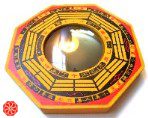
What Are Convex Mirrors?
Convex Bagua mirrors are specifically shaped like an octagon. Each side and the center of the octagon represents one of the nine areas of the Bagua. These areas each represent a different aspect of life, including wealth, career, relationships, and health.
When to Use Convex Mirrors
When I work with home builders, I advise them on creating housing developments that are most auspicious for future residents. We’ll work together to avoid or minimize homes located at T-intersections, the end of a cul-de-sac, corner lots, and poison arrows.
If you already live in a home with any of these situations, however, there are often remedies. When I consult with homeowners, we’ll identify areas of concern and I will advise specific cures. Some of these remedies may include a convex Bagua mirror.
How to Use Convex Mirrors
There are several ways to use convex Bagua mirrors in Feng Shui. One common placement is to hang the mirror just above the front door, facing outward. This is believed to deflect negative energy and protect the home from negative influences. If you have poison arrows facing toward your window, you may hang the mirror above the window. Again, face the mirror outward to deflect negative energy from the outside. Whether with a door or window, the mirror could be inside or outside of the wall. Just make sure the reflective part of the mirror is facing outwards towards the negative energy.
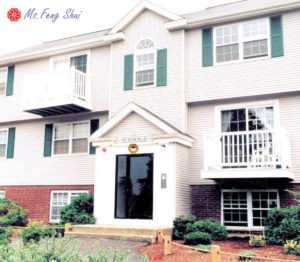
Please ONLY use convex Bagua mirrors for protection and NEVER use them to intentionally harm or bring negativity to others. Use them with caution, as they can be very powerful and can even reflect or amplify negative energy back at you if used incorrectly.
What Convex Mirror Should I Get?
There are several out there but I suggest getting one like this that has a Bagua’s octagonal shape with a circular convex mirror in the middle.
How About Concave Mirrors?
Well, concave mirrors are a whole other subject. They deserved their own blog post.
Next Steps
If you’re interested in using convex Bagua mirrors for Feng Shui in your home or business, it’s important to consult with a Feng Shui expert to determine the best placement for maximum protection. When you use and place them appropriately, convex Bagua mirrors can provide you with powerful protection by bringing positive energy to your space.
If you need more specific and custom guidance to improve your space and your life, I’m available to help. Learn more on my website today and book a virtual consultation. Better Feng Shui can help you in profound ways on life’s journey.
I am a 3rd generation Feng Shui expert and have helped thousands of people add harmony and balance to their homes and offices without making it look like a Chinese restaurant exploded.
I can help you attract the life that you deserve with Feng Shui. Contact me today
Builder & Developer: Taking Charge With Feng Shui
Here is an article I wrote in the Sep/Oct 2020 edition of Builder & Developer Magazine…
Taking Charge With Feng Shui
Building professionals working from home can use Feng Shui to improve experience and productivity
By Jessie Kim
By the time this article is published, I can’t say whether we will still be working from home due to the issues of shelter-in-place orders or if we’ll be back in the now-seemingly relaxing comforts of the office. Either way, you’ll have some tools here to make immediate changes to relieve much of the burden you’re likely experiencing.
Probably like you, I went from driving to school, to the office, to visit clients, back to school, to the kids’ practices, to now setting up work meetings (as well as my kids’ distance learning and virtual practices) all from the “comfort” of my home via videoconference. For the first two weeks at home, I felt overwhelmed, frustrated, angry, sad, and just wanted to be left alone—not typical traits of mine. And then I was reminded of the solution while on a videoconference with a client.
The modern practicality of the 3,000-year-old practice of Feng Shui consistently amazes me. Most people, particularly in the homebuilding industry, only think of Feng Shui for its placement of objects, but it’s also about the placement of ourselves within our environment. Working from home is a challenge because the environment is designed primarily for relaxation, not laser focus on work when others are also home. The good news is that Feng Shui helps us integrate better with our environment, even in times like these.
In a famous incident a few years ago, BBC World had a live video interview of a political analyst from his home office which was crashed by his two small children before his wife could drag them out. Since the quarantine started, such incidents now seem normal. Our efforts to find a quiet place to work or conduct videoconferences have resulted in multiple examples of poor office Feng Shui, which also happen to have real-world implications, even for a videoconference. The client video call included an example of someone who had her back to a window, darkening her face in the video and overwhelming her with energy. Another had their back to the office door, just like the political analyst, where we saw kids running down the hallway and probably giving that person an anxious feeling of people watching over their shoulder. Yet another had a poster behind him of large waves crashing onto a lighthouse, symbolism that probably manifested into a feeling of unease that would explain the bags under his eyes. I even saw someone working from her closet, probably the only way to provide segmentation between home and work life.
It was this video call that reminded me of my bad Feng Shui positioning that needed to be remedied. In an effort to give my husband space for his video calls in the home office while being close to the kids to help with their distance learning, I unwittingly placed myself in a position on the dining table near a fireplace where my back was to the patio door. Once I realized my error, I moved to a location at the table where my back was to a solid wall and I could see all of the doorways to the room. My mood immediately improved. Though I’m still juggling the same workload, I no longer feel stressed out, sad, or overwhelmed. I have perspective over the entire room. It also prevents my kids from videobombing my calls, allowing me to preserve my professionalism. I feel in control again.
If you feel overwhelmed, uneasy about your work environment, or simply can’t stop working at all hours, try to implement these tips for your workspace, however small it may be:
- Keep your back to a solid wall where you can see all windows and doors in the room.
- Ensure proper lighting is in front of you, rather than only behind or directly above you.
- Make sure only calming pictures and elements surround you.
- Eliminate clutter from your space.
- These same principles apply to your workspace at your office, so make sure to apply them when restrictions are lifted.
Oh, and be sure to wash your hands and don’t touch your face!
Jessie Kim is a third generation Feng Shui consultant who works with home builders and now provides
virtual home and oÞce consultations. She may be reached at her contact page.
Originally posted on Builder & Developer Magazine.
What to Know About Asian Homebuyers
From NewHomeSource Professional

When working with Asian homebuyers, belief systems like Feng Shui and Vastu could affect the way they invest in new homes.
In major population hubs like New York City, San Francisco and Los Angeles, this trend is especially apparent as these investors indicate an outbound capital flow from their home countries by investing in American industries like agriculture, technology and, of course, real estate.
In fact, Forbes reports that Chinese nationals have become the largest foreign buyers of American homes. In this industry, home purchases by China’s new wealthy class have grown to a staggering $93 billion in value, with $29 billion coming in 2015 alone.
So, with evidence pointing to this surge in Asian national buyers, you may be thinking: “How can I help this type of client find a new home that suits their needs?”
While Asia is a giant continent with numerous countries with their own cultural beliefs, there may be a few considerations you’ll want to have in mind when assisting Asian homebuyers.
Take the Time to Understand Their Customs
Many homebuyers coming from Asian countries have customs and belief systems that directly affect the homes they can buy — from the direction the home is facing to the history of the land it is built upon.
Two common belief systems to keep in mind with some Asian buyers are Feng Shui and Vastu, which have certain rules regarding a home’s architecture and energy flow.
“Realtors dealing with newly built homes should know the site layouts and designs,” says Jessie Kim, a Feng Shui consultant in Southern California who often works with homebuilders and investors on catering to this Chinese philosophy. “What is going to be built around the properties, home addresses and what types of landscaping plans and materials will be used around the homes are important things to consider.”
With Feng Shui, some common things to avoid are “T” intersections, cul-de-sacs, corner lots, a front door facing the back door or window, stairs and bathrooms facing the front door, kitchens and bathrooms facing or back-to-back to each other and bathrooms directly above the kitchen. You’ll also want to focus on showing homes with a front door that faces south or southeast.
“There are ways to remedy most of these issues, but the less Feng Shui remedies you have to do to the house, the better the home is,” says Kim.
And with Vastu, a Hindu architecture system, the direction of the front door is also very important, as well as having a dedicated space for spiritual statues.
“Just like with Feng Shui, there are different layers that the buyers will be considering, so it’s important to ask the what their Vastu needs and wants are, besides just asking for the number of bedrooms and bathrooms they want in their home,” advises Kim.
A simple question-and-answer session with your clients can help bring to light any of these cultural beliefs and requirements so you can find a home that suits them perfectly.
“Just try to learn about their custom,” adds Kim. “Simple things like taking off your shoes when entering their home will make the homeowners feel comfortable that you are understanding of their culture.”
Discover Their Reason for Buying
The next tip is a simple one: Just find out why they are buying.
“You have to think about what their reasoning is,” says Joan Brothers, president of Manhattan Boutique Real Estate in New York. “And there’s a lot of different reasons why people are coming from Asia to the United States and buying real estate as assets, whether they’re using it for their residential property or as an investment.”
With Chinese investors specifically, there are different levels of buyers. For years, wealthy buyers have been looking to foreign countries to invest their money and now the middle class have been increasingly doing the same thing.
“The main thing will be to send their children to school out of their country,” says Kim. “So by investing in a home in the U.S., they are able to set up residence and when their children are older, they are able to go to school in the U.S. without having to be an international student.”
Having insight to what they want in a new home, whether it be for a residence for their family or just as an investment asset, can better enable you to find a property that fits their needs.
“And diversifying assets is a really good thing to do,” adds Brothers. “It’s either family or business, personal use or for investment.”
Family-Friendly Values
And if you discover that they are looking for a home to set up residence, the next thing to consider is their family values.
“These types of buyers are looking for a home that they can ‘share’ with their family,” says Kim. “Maybe not full time, but they are always aware of possibilities of their families coming to visit and staying with them for extended periods of time.”
So, it may be important to find them a home with an extra bedroom on the ground level or options for multigenerational living. Close proximity to parks, shopping and schools with good ratings would be another major plus, adds Kim.
It’s also wise to make sure you keep everyone involved in the process feeling just that — that they are involved.
“Buying a home is mostly a family decision,” says Sylvia Yang, a sales representative for Brookfield Residential in Azusa, Calif. “Parents and grandparents will often gift the down payment and they need to confirm they like the location and floor plan as well.”
Tying it all together, it really comes down to genuine and personal conversation and asking questions.
“If you can make simple conversation and are interested in the client’s culture, you can create trust and a long-term relationship with them,” says Brothers.
Drew Knight is the Digital Content Associate for Builders Digital Experience (BDX). You can find him online at LinkedIn.
Jessie Kim is a 3rd-generation certified Feng Shui consultant and experienced real estate investor that frequently works with home builders. You can find her online at www.msfengshui.com.
Originally posted at:
Create Living Energy to Attract Homebuyers Using Feng Shui
Here is an article I wrote in the Nov/Dec 2015 edition of Green Homebuilder Magazine…
Feng Shui is simpler than you think. The application of Feng Shui in a model home can help increase sales, even in non-Asian communities because it subconsciously gives prospective homebuyers a feeling of harmony and balance.
Have you ever walked into someone’s home and immediately felt so comfortable that you didn’t want to leave? Perhaps you stayed until late in the evening soaking in the ambiance and energy of the home and its residents. Simply put, that is the experience of good Feng Shui. Now, imagine if all of your model homes could create the same feeling—a feeling where prospective buyers want to move in right away.
We know that people buy out of emotion, not out of logic. It is our goal when building and marketing homes to drive the positive emotional triggers in prospective buyers. While everything may look good on paper, we ultimately want them to fall in love with the home they tour. People naturally feel harmonious and safe in a home when they subconsciously sense the right balance of cleanliness and living energy.
When I work with homebuilders, I try to emphasize the living energy of a home. Living energy gives you the impression that people actually live in the home. They care for it and it cares for them, so to speak. This living energy helps people feel recharged. In a model home, however, it can be difficult to achieve living energy since nobody actually lives there; this is where Feng Shui can be a good complement.
So how do we achieve Feng Shui’s living energy through interior design and staging? How do we ensure that a model home doesn’t feel stagnant and cold? Since we don’t have anybody living in model homes, we need to create a feeling of life—flowing and growing energy through the furnishings, features, lights, plants, and artwork we select.
Many of the model homes that I walk through can be quite frigid and unwelcoming. I have seen themes concentrated on dried flowers and twigs, sharp metal edges in furnishings and artwork, and even dead animals with heads mounted on the walls. These themes seem cold and unwelcoming, don’t they?
Now imagine the uplifting energy of a model home with a calm water feature as you enter the front door, a pot of aromatic fresh flowers in the hallway, the smell of fresh-baked cookies in the kitchen, and a soft couch with a crackling fireplace in the background.
Avoid textures that are rigid, rough, and particularly those that appear lackluster. Stay away from driftwood textures and keep cold metal objects dominating the model home. Instead, use soft patterns such as soft textures on walls, furniture, blankets, towels, and flooring that allow people to lower their guard and sink into the comfort of the home.
The master bedroom should tempt prospective buyers to curl up into the bed. Though a little counter-intuitive, avoid mirrors and ceiling fans in your model bedrooms. While mirrors may give an impression of more space, they can give a feeling of anxiousness as opposed to harmony and security. Likewise, ceiling fans may make logical sense in that they can reduce utility bills, but they subconsciously make people nervous that the ceiling fan will fall on them while they sleep.
Bathrooms are generally the most difficult areas to Feng Shui. They figuratively drain away uplifting energy. Bathrooms should be bright and colorful to create something that could feel like a fun space. To add to that feeling, try some fresh flowers and a small crystal chandelier.
As we know, the kitchen is the area where many women fall in love with a model home. While most of her needs should be addressed in the home design stage, interior design is where we make her feel like she can provide nourishment to her family. The kitchen should be bright and clean with a bowl full of (real) fresh fruit to provide positive energy.
Don’t forget about the kids. Create an interior design that engages children. Use features in the bonus room like a working foosball or small air hockey table that allows them to play and have some fun. Who can resist smiling when a child laughs with enthusiasm? Focus on creating a sustainable and harmonious energy within a model home with soft features that stay active even when nobody lives there. These small things give so much energy back in the home that a prospective buyer will feel welcomed—as though it was designed just for them.
Jessie Kim (Ms. Feng Shui) is a 3rd generation Feng Shui consultant who primarily works withhomebuilders. She can be reached at [email protected] or at www.MsFengShui.com.
Green Homebuilder, Nov/Dec 2015, Page 82
Originally posted at: http://greenhomebuildermag.com/2015/12/22/create-living-energy-to-attract-homebuyers-using-feng-shui/



